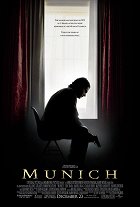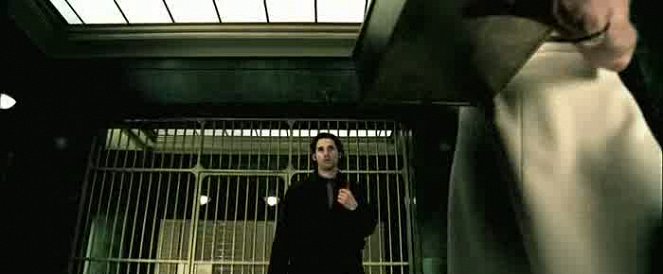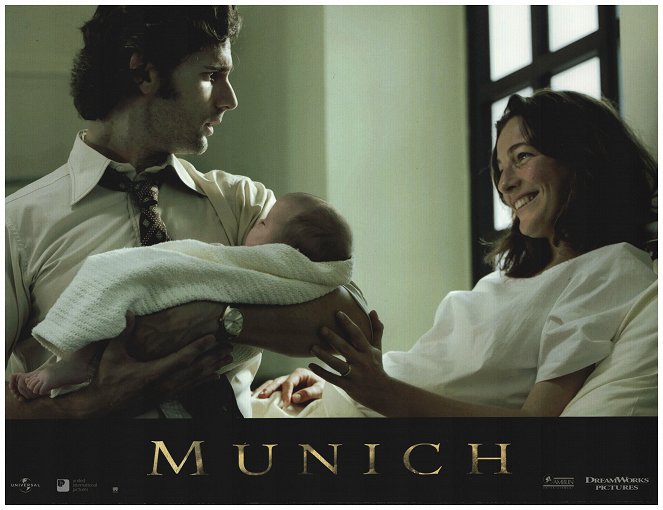Directed by:
Steven SpielbergCinematography:
Janusz KaminskiComposer:
John WilliamsCast:
Eric Bana, Daniel Craig, Ciarán Hinds, Mathieu Kassovitz, Hanns Zischler, Ayelet Zurer, Geoffrey Rush, Gila Almagor, Michael Lonsdale, Mathieu Amalric (more)VOD (3)
Plots(1)
During the 1972 olympic games in munich 11 israeli athletes are taken hostage & murdered by a palestinian terrorist group known as black september. In retaliation the israeli government recruits a group of mossad agents to track down & execute those responsible for the attack. (official distributor synopsis)
Videos (1)
Reviews (11)
Brilliant craftsmanship without a drop of emotion. The combination of such a serious subject with this director promised an emotionally charged spectacle, and yet I witnessed a disproportionately drawn-out revenge spectacle. And while it was supposed to be cold-blooded, not a single scene managed to appeal to me. Spielberg wanted to make a "political espionage" thriller that would cut through the drama with interpersonal relationships, from which the lesson was supposed to be that "violence only breeds more violence." The film contains both, but neither component works as it should. Spielberg did not restrain himself and through the excessive runtime, he tries to create a moral agitprop not only for the Jews but for all people. And yet the skeleton of the story falls apart and the viewer only gets the impression of wholeness in the purges of the Palestinian terrorists, which are just pure craft, nothing more. That actually brings me back to the beginning of my commentary.
()
On the advice of a mysterious French family organization, Mossad assassins head to London in search of their target, the leader of the Palestinian Black September movement. There, however, the assassination is thwarted by undercover CIA agents guarding the leader in exchange for not attacking American diplomats. Later that evening, one of the assassins is killed by a Dutch assassin, apparently hired by the Palestine Liberation Front. God, I love the '70s! I find Munich (like Saving Private Ryan or Schindler's List) the perfect motif on which to pair Spielberg's choreography with Kaminski's experimentation. The numerous scenes and their detailed composition here create a view of a Europe riddled with agents meeting in restaurants, markets, and bars, where everyone has a purpose and takes a side. Even with this simplification and aesthetic stylization, Munich is a first-rate spy genre film (the spy team is like something out of a game) where almost every sequence is carefully crafted and has its own visual attributes. The risk of sentimental idiocy is condensed here to just one scene in which a sweaty Eric Bana has sex with a terrorist (I would have been so uncomfortable in the cinema), the rest is still Spielberg full of energy and ideas. Given the way the film looks and tells the story, it still more than anything creates the illusion that the world was the most interesting when it was the most dangerous.
()
Munich definitely isn’t controversial (if you’re not a fanatical supporter of either side), it doesn’t say anything new, nor does it dive into the depths of the Israeli-Palestinian conflict. It just scratches the surface and the characters talk about home. But that doesn’t mean that it is a bad movie. Quite the contrary, and because Spielberg chose (for him) an unusual method of expression (it actually seems that the movie is “controlled" Kaminski’s camera), it’s pretty fascinating. The authors also expect at least some basic knowledge about the topic from the viewer, therefore they don’t explain a lot of the names or acronyms, which is good, since the movie doesn’t treat you like a toddler.
()
I was awaiting Steven Spielberg's Munich with considerable tension. Not only because of the fact that the classic of American cinema showed, with his latest film War of the Worlds, that he can brilliantly comprehend, say, trashy themes. I eagerly awaited how the Jew Spielberg was going to deal with such a burning and painful question as Israel's relationship to terrorism. I'm not disappointed. On the contrary. I'm taken aback and emotionally overwhelmed. The scope of Munich is a typical representative of Hollywood in recent years - the massive runtime amounts to weaker spots, polyglots, loss of pace. Nevertheless, a filmmaker of Spielberg's extra class can reasonably balance adrenaline and an idea without one or the other suffering too much. Munich thus alternates adrenaline sequences of individual hired killers with calm meditative sections, in which the heroes reflect on ethics, law and justice. The alternation of the two passages is sometimes captivating (that is, when the idea blends into the action sequence, as is the case, for example, with the action in Athens), whilst sometimes the "ethical" sections seem too sweeping and lose their inner tension. It is extremely commendable that Spielberg avoided, as much as possible, a clear answer to the burning question of "who is to blame?" His only answer is the hero Evram in an absolutely captivating performance (I dare say) by actor Eric Bana. In it, all the ambiguity of justice and the question of morality are connected in the captivating dilemma of a man who, in an effort to protect his home, loses it, together with his identity and his Judaism. The illusion of just retribution turns into a futile hunt for some higher right of revenge, into a growing list of the dead on both sides, and into a mental black hole in which everything one leans on disappears. If you are waiting for a reconstruction of the Munich events, you will be disappointed. The script artfully decomposes the tragedy into a passing story – from the initial acquaintance through period reports to the captivating and devastating finale, which we see as if through Evram's eyes. Munich contains several strong moments that aroused in me unexpected eruptions of emotions (Evram, who hears his daughter's voice for the first time, a love scene intertwined with the massacre of hostages). The film also contains several moments, that seem to be excessive, when the narrative concentration becomes a bit distracting. However, as a whole, the film is extremely consistent, even in terms of ideas, which do their best not to categorize and to avoid stereotypes. Munich is a very impressive and powerful film. In one real event, it reflects all the perversion and absurdity of one of the worst crises of humanity today. The most valuable part of the film, however, is the personal story of Evram, in which everything important is immediately reflected. I also have to point out the excellent soundtrack by John Williams, the excellent camera of Janusz Kamiński and the surprisingly good Daniel Craig. Once again, I need to emphasize Steven Spielberg, who perfectly blends craftsmanship with the confidence of a filmmaker who knows what he wants to say.
()
(less)
(more)
In the case of Munich, a comparison with the recently made film The Baader Meinhof Complex is possible and even desirable. While the German film is a precise analysis of a terrorist organization and manages to fit its inception, era of greatest success, and defeat into one feature-length film in a very complex way, prioritizing the analytical perspective over the entertaining aspect, Spielberg used a well-known terrorist act as a starting point for a drama that aims to entertain the audience and take certain ethical stances. It is definitely not a credible film in terms of historical accuracy, mainly because there are no verifiable documents - secret services and terrorist organizations usually do not reveal the details of their operations to the public. The Mossad agent, who served as the inspiration for the main protagonist, also noted that the character of the actor portraying him differed significantly from his thoughts and actions, so the film is certainly not a credible account of the events. Spielberg's approach is certainly pleasing to audiences, but from my point of view, the actions of the Israeli commando are burdened by unprofessionalism and in many details, they are not trustworthy. The screenwriter drew too much inspiration from spy pop culture thrillers like Ronin; for example, it is difficult for me to imagine that the top-secret Mossad, considered along with the East German Stasi as the absolute pinnacle of secret services in the second half of the 20th century, would depend on collaboration with an unknown private organization with uncertain goals and unpredictable behavior. From an acting perspective, this is a high-quality project. The screenplay and direction are traditionally at a high level, as is customary for Spielberg. The unexpected encounter of members of the commando with a group of OOP fighters, with a series of polished dialogues and the scene of their rivalry over a radio receiver, is undoubtedly pleasing to the audience and dramatically refined. Likewise, the portrayal of individual terrorist attacks, executions, and conflicts will satisfy both traditional genre fans and viewers who are looking for more than a one-dimensional action spectacle. Overall impression: 85%.
()



Ads